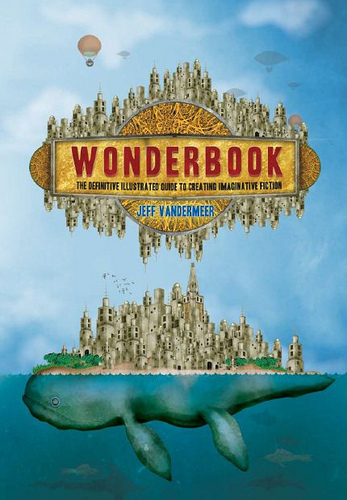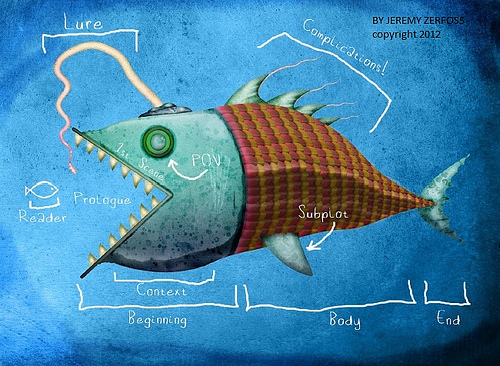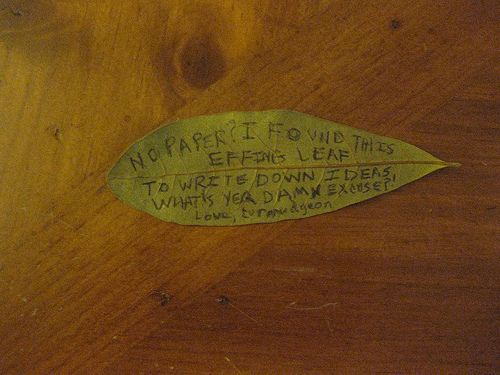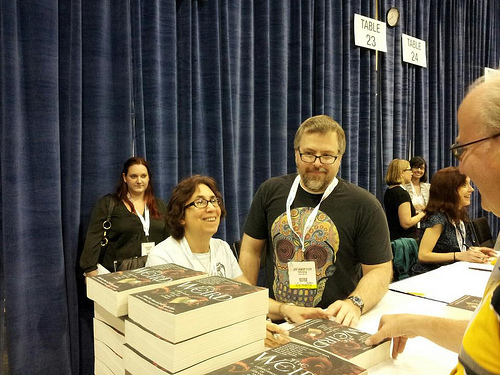Jeff VanderMeer's Blog, page 29
June 18, 2012
Wonderbook: The Illustrated Guide to Creating Imaginative Fiction
My WONDERBOOK: The Illustrated Guide to Creating Imaginative Fiction for Abrams Image is well on its way to being finalized, with publication set for 2013. This will be the first creative writing guide that doesn’t just supplement text with images, but replaces text with image. In fact, its 300 pages will include over 175 diagrams, illustrations, and photographs. The diagrams will be radically different from what you find in most writing books, and the integration of the text with image will also be something you haven’t seen before.
The cover above is a rough, but close to being final—it’s by Jeremy Zerfoss, who is doing the majority of the art, and the design of the book. The image below is an example of one of the ways in which this approach can be useful in teaching creative writing. Writer and filmmaker Gregory Bossert is planning to create an animated tutorial around the prologue fish.
The main text will include chapters on Inspiration, Elements of Story, Beginnings & Endings, Writing & Revision, The Bleeding Edge, and a special chapter on writing exercises that I think will blow most people’s minds visually—and will set out all of the things my wife and I do in our workshops and masterclasses. Elements like Characterization will be woven into the discussion in all of the chapters, since separating out the people from the story seems pointless to me.
In addition, the book will feature short essays on a variety of writing-related subjects by Neil Gaiman, Lev Grossman, Karen Joy Fowler, Lauren Beukes, Charles Yu, Karin Lowachee, Catherynne M. Valente, Michael Moorcock, and several others, as well as a long exclusive discussion about craft with George R.R. Martin. A comprehensive list of over 700 essential non-realist novels is just one item of interest in the appendices. The format of the book will allow annotations and asides in the margins for additional value.
Another unique aspect of the book is that it makes no distinctions between artificial boundaries between mainstream and genre, and it takes as its foundation fantastical literature. Which is to say, Wonderbook will be of use to any beginning or intermediate writer, but assumes a default of the fantastical. On facebook awhile back I indicated I was trying to create a new visual language for teaching creative writing. In retrospect, that was a grandiose claim. But I do think we have accomplished something special regardless.
Wonderbook: The Illustrated Guide to Creating Imaginative Fiction originally appeared on Ecstatic Days on June 18, 2012.
The Goat Variations: Free VanderFiction for Other Worlds Than These
[image error]
My story “The Goat Variations” first appeared in Other Earths edited by Nick Gevers & Jay Lake, and then was reprinted in my collection The Third Bear. Now it’s been reprinted in John Joseph Adams’ Other Worlds Than These anthology. He has a great new section on his website for the anthology, and I’ve let them post the story online in its entirety.
When first published, and then reprinted in my collection, “The Goat Variations” was fairly controversial, with some making the assertion that I was just using fiction to make a political point about President George W. Bush. Well, if so…so what? That’s not the real focus of the story, but if it were, bully for me.
Hope you enjoy it.

(It’s just a rubber head, folks. Looks a little bit more like that guy from Kiss anyway.)
The Goat Variations: Free VanderFiction for Other Worlds Than These originally appeared on Ecstatic Days on June 18, 2012.
June 16, 2012
Odd and Leviathan Anthology Updates
Just a short note about ongoing projects. Because of our focus on the feminist spec fic anthology (see blog entry below), we’re pushing Odd back to the fall/winter and will be in touch with subscribers about a restructured schedule by Sept/October. Leviathan 5 is being pushed into 2013-14 on Chizine’s schedule for similar reasons. The feminist spec fic antho is hundreds of hours of work for an honorarium, Odd is a start-up, and Leviathan would be more work for free. The honest truth is that we can only absorb the time/money loss of one gratis or start-up project at a time, so we hope you’ll understand these delays. The feminist spec fic anthology was a wonderful opportunity, but we have to surround it with paying projects.
We’ve also just come off the busiest two years of our lives, with The Weird and other books, and I’m just getting back into my own writing. So all of this factors into the decision. If you have any questions, feel free to ask. Thanks for your patience.
Odd and Leviathan Anthology Updates originally appeared on Ecstatic Days on June 16, 2012.
June 15, 2012
Friday Writing Advice: Heed Leaf #1
Corollary: As a reader, I don’t care what you think about current events or international politics or what you had for breakfast or your hangnail, so get off social media…
and
Heed the Leaf
Friday Writing Advice: Heed Leaf #1 originally appeared on Ecstatic Days on June 15, 2012.
June 14, 2012
Toward Prevention of Brain Scarring
Having had some barricades against the internet for a few days now while I work on deadlines, I’m feeling recharged and refreshed. I think that in addition to the whole idea of having too many open channels in your mind at times because of the e-world, there’s something to be said for not being open to lots of ideas in the course of the day. That may sound ridiculous, for a writer, but the fact is that there is so much contradictory information and advice on the internet, so many emphatically stated viewpoints about issues related to writing, that you can freeze yourself in your writing just by being exposed to too much—by internalizing…everything. As advice also trends toward righteousness and offering up moral judgment, too, a kind of binary us/them rises up that isn’t useful even when you agree with a position. And not only do we have too much writing advice out there, and assign too much authority to the opinions of members of the blogosphere for no particular reason…we also have this seemingly self-destructive need to revisit information and opinions we don’t actually agree with, but that still infect us. And so you wind up wasting a lot of mental effort that could go to the writing circling back over issues that in the grand scheme of things aren’t useful to your writing. While nursing the low-grade fever of a mind-virus that can only fade if you don’t keep re-infecting yourself. You’re not required to do so, contrary to a kind of underlying belief that all of this ephemeral stuff, forgotten in a week, matters.
For those who say we should engage with the world, I would say: I indeed want to engage with the world, but I’m less and less sure I want to engage with the narrow sliver of it represented by the resounding confidence of the majority of opinion pieces out there in the e-sphere, on any side of an issue. Certainty is not useful to fiction, and I am always wary of those who are certain. Fiction writers who are infected by too many received ideas, fed by too many received ideas, tend to turn out clichéd work over time, too. I think all of us, myself included, need to seek out complexity, subtlety, nuance, and associated impulses. (Slow blogging as a concept is beginning to attract me more and more as a result.)
The meat world at least regulates the flow of Too Much to something manageable, while providing useful additional context. This also seems to me more conducive to building community and mutual respect, having a balance, because unfortunately, as we see in politics and basically all areas, the expression of beliefs on the internet seems to be dividing us and emphasizing our differences more and more, sharpening our ideological edges so that we often cut ourselves while trying to cut others…which makes it harder to actually get things done and to be proactive…often on the very issues everyone is so passionate about.
And with that, I’m gone again!
Toward Prevention of Brain Scarring originally appeared on Ecstatic Days on June 14, 2012.
June 12, 2012
Open Call for Submissions – Feminist Speculative Fiction Anthology
Ann & Jeff VanderMeer are pleased to announce a call for submissions for a new anthology on Feminist Speculative Literature. This project will be published by PM Press under the guidance and co-publishing arrangement with Jef Smith of GeekRadical and is scheduled to be released in May 2013. The anthology will emphasize women’s speculative fiction from the 1970s onward, looking to explore women’s rights as well as gender/race/class/etc. from as many perspectives as possible. Although we already have stories and writers in mind we also know that we can’t see everything so are asking for submissions as well as suggestions. If in doubt, send it.
We will read submissions between June 15, 2012 and August 5, 2012. Any English-language story (or translation into English) previously published since 1970 on a website or in a print publication is eligible for consideration. Looking for reprints only (standard reprint rates apply). Prefer works under 10,000 words. Willing to look at all kinds of Feminist Speculative fiction, but mainly interested in work that pushes the boundaries, that is truly unique to the genre.
Submissions up to 10,000 words should be sent in a Word or RTF document attachment to femspecfic at hotmail.com. Please cut-and-paste the first three paragraphs into the body of your email and include prior publication information, but no need to include any biographical information about yourself. If you prefer, use snail mail by sending your work to POB 38190, Tallahassee, FL 32315, USA. Snail mail submissions should be marked on the outside of the envelope as for Feminist Spec Fic consideration. No SASE is required if you prefer email response. All submissions will be responded to no later than August 15, 2012; please do not query about a submission prior to that date. Those sending in their suggestions—thanks so much, and thanks for understanding that we will not have time to reply.
Payment will be on publication, at standard reprint rates of one to two cents per word, against a share of any royalties from the North American or foreign editions, as well as one contributor copy.
(Ann here: if you post questions as comments, I will do my best to answer in the comments as soon as possible – thx!)
Open Call for Submissions – Feminist Speculative Fiction Anthology originally appeared on Ecstatic Days on June 12, 2012.




June 7, 2012
The Fine Art of Dropping Out: VanderMeer Enters the Internet-Proof Bunker
I’ve got a slew of deadlines between now and the middle of July. At least for the next month, possibly longer, I’ll be off the internet for the most part and only checking email in the evenings. You can still find material by me on Weirdfictionreview.com and Omnivoracious, the Amazon book blog, during this time—as well as reviews forthcoming at the Guardian and the LA Times, among others.
In this day and age, for me, dropping out and just working out of the house 24-7 is the only way to achieve the level of concentration needed. That includes stocking up on the right food! Yes, that’s right—as pictured above, including lots of antioxidents, lots of protein and complex carbs since it means a more sedentary lifestyle for a bit. Also food that doesn’t require any preparation and can be doled out in small portions so I can eat just a little bit six times a day and thus keep the right energy level throughout the whole day–and work the whole day without stopping. Also making sure the home gym is in working order in case I don’t get to the gym. I’m not particularly interested in coming out the other side and finding I’m less healthy. It’s a bit of a siege mentality, and may seem faintly ridiculous, but it’s necessary.
In other news, I am going to be teaching at Stonecoast in Maine (July 12), going to ReaderCon (July 13-15), and helping run the Shared Worlds writing camp (July 23-Aug 4), which will include public readings.
Since I’ll be dormant here, feel free to use the comments thread to tell me what you’re up to or to tell us about any new books. Just note that full URLs often trip up the spam filter here.
If I don’t respond promptly to email, please contact Ann. Don’t contact me via facebook email as I won’t be checking it.
The Fine Art of Dropping Out: VanderMeer Enters the Internet-Proof Bunker originally appeared on Ecstatic Days on June 7, 2012.
SF in the Mainstream at BEA: The Panel and the Coverage
So Ann and I just got back from BEA in New York City, where we were promoting the Tor edition of our massive new The Weird anthology. We had a wonderful time and met so many great people. I wish I had more time to blog about it, but you know who you are—thanks for making our trip so great. Thanks too to Tor—everything ran smoothly, and it was great to hang out with our editor there, Liz Gorinsky, and our publicist, Alexis Nixon.
In addition to the autograph session pictured above, we were part of a panel on SF & the Mainstream hosted by Ryan Britt that also featured Walter Mosley and John Scalzi. The panel was quite interesting, and the only regret I had is that it was over so quickly—it seemed like we were just getting into the meat of the issues brought up. Ideas about genre, about the meaning of perfection and technology, diversity in the field, etc. (I’m hopeful I can convince Mosley to spend the time answering some follow-up questions for an Amazon feature.) Back-stage had been a lot of fun, too, since both Mosley and Scalzi are incredibly entertaining people. (Indeed, Scalzi’s “need a hug” comment to me during the panel cracked me up.) I was also quite chuffed that Mosley, whose novels helped influence my own Finch a bit, told me he’d enjoyed City of Saints & Madmen.
But there’s the panel and then there’s the coverage of the panel….and the coverage has veered from accurate and objective to completely incorrect, and I’d like to talk about that just a little bit because it fascinates me how something that would seem so simple as coverage of a half-hour panel can vary so drastically.
Ann and I concur that the most accurate account comes from Ron Hogan at Tor.com. Ron’s got the quotes right, and who said what correct as well. There’s the least attempt to editorialize just a genuine effort at straight-on reporting. It doesn’t include everything we talked about, but you have to pick and choose.
[UPDATE 6pm: Rose Fox's account at Publishers Weekly was just posted. It is also very accurate, and taken with Hogan's gives a complete picture.]
The New Yorker blog’s coverage, on the other hand, is pretty shoddy, and I reproduce the full entry here since I’m about to give them corrections, and this version may change:
Back at the Uptown stage, James VanderMeer, the editor of the “The New Weird,” an anthology of science fiction, was talking about the composition of the B.E.A. It’s “mostly white, mostly featuring writers from the U.S. and the U.K… In ‘The Weird’ we wanted to show, yeah, there’s this stuff, but there’s also so much other amazing stuff, from Japan, from Nigeria, from all over the place. In the period from 1910 to about 1930, people all over the world were thinking about the same things.” Walter Mosley, a sci-fi elder dressed like a beatnik in a black leather jacket and cap, reflecting on the capacious world of contemporary genre fiction, remembered his early rejections from publishers. “They told me, ‘White people don’t read about black people, black women don’t like black men, and black men don’t read, so who is going to buy this book?’ ” Sorting books into rigid categories, VanderMeer said, is “neither how it’s always been, nor how it should be.” Mosley: “One Hundred Years of Solitude—it’s a great fantasy novel, but also a great work of literature.”
What’s wrong with this description? Just about everything. Let me break it down. (1) My name is Jeff VanderMeer not James VanderMeer. (2) I coedited The New Weird with Ann, not by myself. (3) The book we had at BEA was The Weird not The New Weird. (4) The book is not science fiction. (5) The mostly white comment about BEA was from Walter Mosley, not from me. (6) The mostly white comment is then shoehorned in with my “mostly featuring writers from the US and UK”, which was about some prior compilation anthologies, not about BEA. (7) Walter Mosley is definitely NOT a “sci-fi elder” but someone who is mostly known for his great mystery series, while also having written some SF. (8) Scalzi said the quote about “neither how it’s always been nor how it should be.” (9) Ann is not quoted at all and erased from the panel entirely, as is John Scalzi.
The third account, from Ed Champion, trades outright inaccuracy for suspect editorializing, and some rather bogus attempts to get inside of the panelists’ heads. It all starts to go wrong when Champion writes in a completely tone-deaf new journalism way about moderator Britt’s “gray vest insinuating some classy authority” and then states that the two big questions are (1) “How do the glories of ‘weird’ in any form get self-respect,” given that “plenty of us have experienced ‘weird’ moments in our lives without having to cleave to genre.” and (2) “…whether Walter Mosley would attempt to rile up the crowd with an outlandish and unsubtle statement.” Neither of these questions were on my or Ann’s minds, and I dare say they weren’t in the minds of most of the gathered crowd—although I did in passing address the first question during the panel (not reported on by Champion). Immediately following these… questions… Champion writes that “But before Mosley opened his mouth, Jeff VanderMeer” spoke up. The clumsy transition makes this read to me as the false assertion that I interrupted Mosley at some point during the panel.
Later in the account, Champion includes Mosley’s comment (paraphrased, I think—this doesn’t strike me as his exact wording) that “One of the things walking around this place is how many white people are. And it’s another weird moment. Maybe it’s a weird moment for me, not for other people in here.” In response to which he writes “I did observe Jeff VanderMeer, dressed in a white suit and seated next to Mosley, sink further into his seat. Ann VanderMeer attempted to return the conversation to the human factor that Scalzi had set up so well…. Jeff VanderMeer attempted to respond to Mosley by pointing out that the duo had selected stories “from Japan, from Nigeria, from all over the place.” Mosley spent much of the time after this puffing up his cheeks.”
This is a very odd and inaccurate interpretation of that sequence of events. First of all, it attributes a physical reaction to me that I don’t recall and as an implied reaction to Mosley’s comment, which is definitely false. What I was thinking as I possibly innocently shifted in my seat, unaware my every movement was going to be parsed from afar, was “fair point” and then was thinking of how this was a good entry into discussion of how when we’d looked out on the vast majority of previous compilation volumes like The Weird we saw mostly UK/US white male writers, and how we wanted to show what was missing from the equation by including work from other countries, etc. Ann, meanwhile, wasn’t trying to redirect anything—she was just answering the moderator’s original question. Finally, I have no recollection of Mosley figuratively or literally then “puffing up his cheeks” for most of the rest of the time. I certainly at no point thought he was trying to “rile up” the crowd, and I didn’t find his comments to be anything other than interesting and useful.
Champion also writes that “Then Mosley tried to pass off Scalzi’s anecdote about the Star Trek communicator as his own.” This is another odd statement. Why would Mosley have to have some kind of bad intent even if he was repeating something already said? In any event, although I don’t recall that particular exchange, I can say that this attempt to parse intent seems totally off-base.
The inaccuracies in the New Yorker account and the kind of banal tyro-novelist attempts at sussing motivation on Champion’s part seem somewhat unfortunate, given that we had a lively and interesting discussion. The fact that all of the panelists were coming at the subject from different angles created some fascinating exchanges. I’d be on a panel with these same participants in a heartbeat, and I really enjoyed meeting Mosley for the first time.
SF in the Mainstream at BEA: The Panel and the Coverage originally appeared on Ecstatic Days on June 7, 2012.
May 31, 2012
Feminist SF Anthology–Fully Funded, and Then Some!
Ann and I are thrilled to announce that not only did the kickstarter for the Feminist SF Anthology hit its $12,000 goal for full funding, but went over $15,000. The extra money will help in areas like funding translations and adding pages to the book. Thanks SO MUCH to Jef Smith for proposing this project to us and to everyone who contributed or helped signal boost. In the end, the contributions averaged out to about $31 per person—a true group effort. And every little bit helped.
Personally, I feel very proud of our community and as we now move on to the hard part—selecting stories—we very much feel a responsibility to do the best possible job we can on this project. It’ll be a tough job—we were just talking the other day about how the book could be 500,000 words and not include all of the great stuff we love. Winnowing it down is going to be excruciating and painful.
Ann will be reading unsolicited reprint submissions starting in mid-June (more on that next week) and I will be using part of July for research, traveling north to visit some private libraries. (This travel is not on the kickstarter’s dime.)
Again, thanks to everyone—you’re all incredible, awesome people. We really feel a little choked up right now over the support for this project, and we’re looking forward to getting to work.
Feminist SF Anthology–Fully Funded, and Then Some! originally appeared on Ecstatic Days on May 31, 2012.




Interviews and Advice
Furious fiction interview with me above, and Jenn Brissettinterviews me for the Gotham City Workshop, with questions about writing advice. I want to spotlight this bit, since these people were so important to me as a beginning writer:
“I had a creative writing teacher, Denise Standiford, in high school who introduced me to Angela Carter and who took me seriously. That was more important than any advice. In college at the University of Florida I was fortunate enough to fall under the wing for three very well-published writers. The first was Jane Stuart, the novelist daughter of Jesse Stuart. She also took me seriously, even when my work didn’t perhaps merit it, and she critiqued it, too. At the same time, the novelist Meredith Ann Pierce allowed me to be part of a workshop she ran. Pierce really looked at my work and offered great comments. And also during that period, the poet Enid Shomer critiqued my work and was very kind to me. All of these women during my formative years as a writer made it clear to me that I had some talent and that I should pursue my writing. I’m sure they all gave me great advice as well, but you can find advice anywhere. What you can’t always find is faith.”
Interviews and Advice originally appeared on Ecstatic Days on May 31, 2012.














